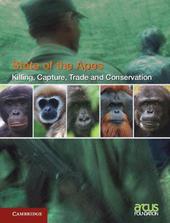
|
Killing, Capture, Trade and Ape Conservation: Volume 4
Hardback
Main Details
| Title |
Killing, Capture, Trade and Ape Conservation: Volume 4
|
| Authors and Contributors |
Edited by Arcus Foundation
|
| Series | State of the Apes |
|---|
| Physical Properties |
| Format:Hardback | | Pages:408 | | Dimensions(mm): Height 253,Width 194 |
|
| Category/Genre | Primates |
|---|
| ISBN/Barcode |
9781108487948
|
| Classifications | Dewey:333.9598 |
|---|
| Audience | | Professional & Vocational | |
|---|
| Illustrations |
Worked examples or Exercises
|
|
Publishing Details |
| Publisher |
Cambridge University Press
|
| Imprint |
Cambridge University Press
|
| Publication Date |
29 April 2021 |
| Publication Country |
United Kingdom
|
Description
The illegal trade in live apes, ape meat and body parts occurs across all ape range states and poses a significant and growing threat to the long-term survival of wild ape populations worldwide. What was once a purely subsistence and cultural activity, now encompasses a global multi-million-dollar trade run by sophisticated trans-boundary criminal networks. The challenge lies in teasing apart the complex and interrelated factors that drive the ape trade, while implementing strategies that do not exacerbate inequality. This volume of State of the Apes brings together original research and analysis with topical case studies and emerging best practices, to further the ape conservation agenda around killing, capture and trade. This title is also available as Open Access via Cambridge Core.
Author Biography
The Arcus Foundation is a private grant-making foundation that advances social justice and conservation goals. The Arcus Foundation works globally and has offices in New York City, USA, and Cambridge, UK.
Reviews'This fourth volume in the publisher's State of the Apes series provides multisourced information synthesized and clearly explained, and colorful, easily understood tables and figures ... Highly recommended.' L. K. Sheeran, Choice Magazine 'This is a very impressive treatise. It contains tables and maps documenting available data on numerous populations of extant apes and the major threats to their existence. The discussions of problems facing ape populations today are extensive and thoughtful, addressing the many different perspectives from local populations to large international organizations. This is supplemented by a glossary of the important factors that are discussed.' John Fleagle, Quarterly Review of Biology 'a very impressive treatise' John Fleagle, The Quarterly Review of Biology
|